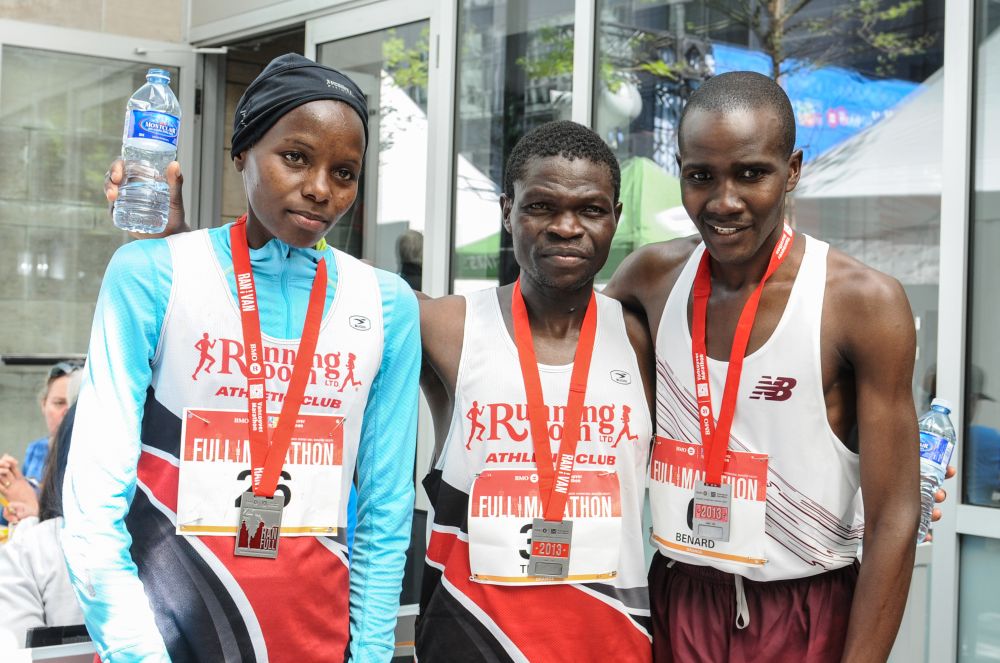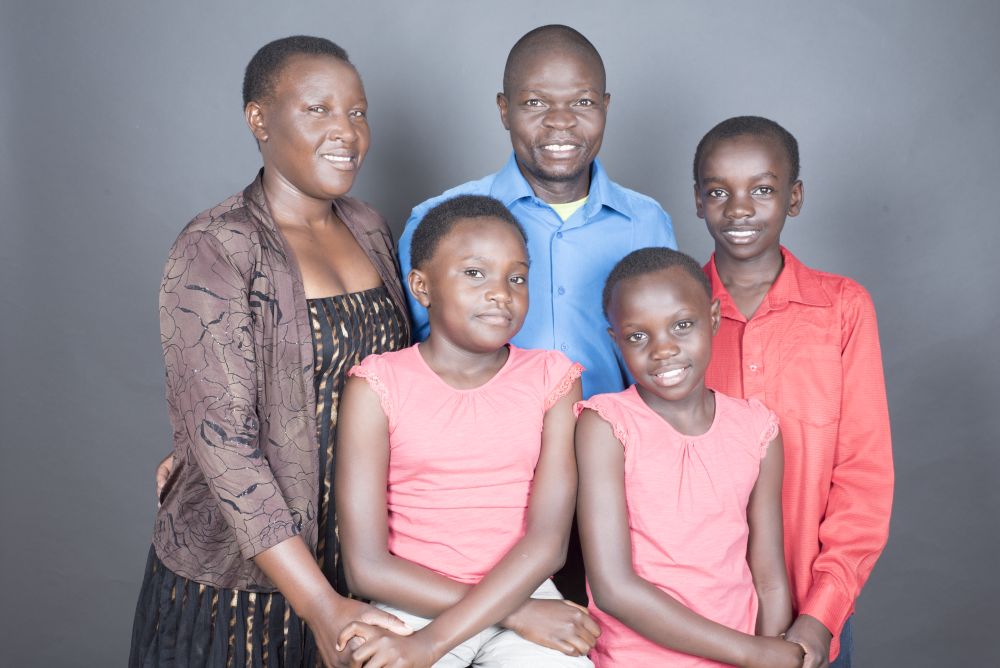From the September 2017 issue
By Rhiannon Russel
Growing up in Kisii, in western Kenya, Thomas Omwenga was an athletic kid. But it wasn’t until he started high school that he realized he had real talent, winning races from the 1,500m to 10,000m. Only then did his father reveal that speed was in their blood: Omwenga’s dad had raced at the national level.
“He told me, ‘You will run,’” says the 37-year-old Omwenga, sitting at a Tim Hortons in Hamilton, where he now lives. “But there were many challenges.” His father had been sick for years and the expensive medical bills added up, so there was no money for Omwenga to go to college. He tried growing tomatoes and selling chickens and eggs but didn’t make much money.
 RELATED: Documentary to watch: Gun Runners
RELATED: Documentary to watch: Gun Runners
Omwenga decided to move to Nairobi and began running at an army camp. Even then, before two established Kenyan runners stepped in to provide food and housing for the trainees, Omwenga remembers drinking hot water with lemon after 10k runs, then going to bed with an empty stomach. He didn’t have any food. “That did not make me give up,” he says. He wasn’t married at the time, and didn’t have anyone to support by himself. “It was only me and my stomach. So I kept pushing.”
In 2000, he won a 5,000m race in 14:05. A German agent scouted him, and Omwenga flew to Germany, where he won several more races. But when his agent began taking more than his share of the winnings, Omwenga cut ties and moved back to Kenya.
There, he got married, had a son and purchased a plot of land for his family to farm. Then he flew across the globe to compete in races in Canada and the United States. He’d take the prize money – anywhere from $3,000 to $10,000 per race – home, and then get back on a plane. He and his wife had two more children, both daughters.
“When you are by yourself, your family lives far away, and they depend on you for everything, life is not easy. There is no happiness.”
In 2007, 2008 and 2010, Omwenga won the BMO Vancouver Marathon. In 2012 alone, he ran five marathons, winning four: Quebec City, Manitoba, Victoria and a tiny race in Prince Edward County, Ont., because the prize purse was worth the punishment of another 42.2k effort. That year, he and his wife decided he should stay in Canada and work, rather than flying home to Kenya, which cost thousands of dollars. With his earnings here, he’d be able to send his children to private school – something that was important to him, since the quality of public education in Kenya is low. “I don’t want my kids to grow up with the life I grew up in, struggling financially with school fees because my parents were not able,” he says.
RELATED: Omwenga wins third marathon of 2012 in Victoria
Omwenga settled in Hamilton juggling three jobs, including shift work at factories and a gig at the YMCA. He’d work day and night, leaving one job and heading to the next. The following few months were tough for other reasons, too. Omwenga had never lived in Canada during the winter before and to avoid the snow and ice, he’d run on the indoor track at McMaster University. Between working and training, he was exhausted.
Despite the challenges, in 2013, Omwenga won the Vancouver Marathon for a fourth time. But he missed his family dearly. “I learned one thing,” he says. “When you are by yourself, your family lives far away, and they depend on you for everything, life is not easy. There is no happiness.”
“Thomas was very humble; he’s a very gracious man,” says Frederiksen. “He did not ask for any support at that time.”
Back home, the family had also been dealing with daughter Mercy’s spina bifida – she wasn’t able to get proper treatment at hospitals in Kenya. By chance, when Omwenga was at the Scotiabank Toronto Waterfront Marathon, he met a man named Michael Frederiksen at a pre-race dinner for elites and vips at the Fairmont Royal York. Frederiksen is the president of Community Education Services Canada (CESC), a nonprofit that helps provide access to education for Kenyan youth who’ve been orphaned by HIV/AIDS. Over the years, CESC had hosted many Kenyan athletes when they came to Toronto for the race.
Omwenga told Frederiksen about his family back home and mentioned Mercy’s condition. “Thomas was very humble; he’s a very gracious man,” says Frederiksen. “He did not ask for any support at that time.”
Frederiksen told the runner he’d be in Kenya the following year and would visit his family and pass along greetings from Omwenga. So he did. He saw the family’s five-acre farm, where they kept cows and chickens, grew mango and banana trees, and tended a vegetable garden. Whatever they didn’t eat themselves, they’d sell at the market. The children were well-dressed, Frederiksen says, and weren’t in acute poverty like so many kids he’d seen in rural Kenya.
“Thomas had provided for them through his running,” he says. “That’s what many of the (Kenyan) runners do – they run over here, they earn some money, and they send it back to their family.”
But he could see that the family was struggling. And Mercy, despite her happy, outgoing personality, wouldn’t have much of a future there, he says. She’s not able to walk.
“The impact of seeing Mercy in her own home, in her own environment, is what moved me to come back here and say, we really have to do something,” Frederiksen says.
He called doctors in Kenya who’d seen Mercy, and they told him they’d done all they could do for her there. Together with CESC, he arranged an appointment at Montreal’s Shriners Hospital for Children, which agreed to pay the costs associated with her visit. A church in Montreal turned its basement into a two-bedroom apartment for the
family, so they’d have a place to stay while they were in the city.
CESC also launched a fundraising campaign that brought in $17,000 – enough to cover the $5,000 plane tickets, as well as living expenses for the family over the months to come. They arrived in Canada with visas just days before Mercy’s appointment. In September this year, she’ll meet with the doctors again to determine a treatment plan.
“It was quite a process,” says Frederiksen. “It wasn’t overnight. It was well over a year… Our dream for her, Thomas’s dream for her, is that she’ll be mobile and that she’ll be able to walk to a certain extent.” Omwenga is now a permanent resident, so he’ll be able to sponsor the family, Frederiksen says.
What was it like being reunited after five long years? A wide grin breaks out on Omwenga’s face. “Our patience paid off,” he says. “We are together now.” During their first few weeks in Hamilton, they stayed at a friend’s house, then moved into their own apartment near McMaster University in June. Omwenga works full-time as a custodian at Mac and part-time as a dietary aide at a nursing home. He hopes one day to study physiotherapy or massage therapy.
The children are settling in well. Isaac, 15, and Sylvia, 11, enjoy running, like their dad. They’ve both joined a running club for kids called the Time Bandits, founded by one of Omwenga’s friends. They’ve signed up for swimming lessons, too.
The pride Omwenga has for his kids is evident: “They speak (better) English than I do,” he says. “And they don’t have an accent like me… Isaac is very strong.” The teen ran a mile at a track meet in 5:50, with little training.
Sylvia, who was only six when her dad left for Canada, is eager to spend as much time as she can with him now. “When I’m leaving (for work), she doesn’t want me to leave the house,” he says. He shows off photos of them in their grey Time Bandits T-shirts.
As for 12-year-old Mercy, she’s “extraordinary,” he says – very sharp, a quick learner. They’ll all go to school in September.
Omwenga acknowledges his wife, Margaret, pulled a lot of weight, raising their kids and running the farm. “She is a wonderful mother,” he says. This summer, she’ll start part-time custodial work at McMaster – she’s on days, while her husband is on nights – and English classes.

With his family back together, Omwenga also intends to get back to racing. Over the past two years, he trained on and off, running the Edmonton and Manitoba marathons in 2015 and the Around the Bay 5k in 2016, but he had other priorities, among them recovering from an injury and providing for his family.
Canada’s free public education relieves some of the financial pressure. “Now that they’re here, my goal is to go back to active running,” he says. “I want to renew my reputation.” He has begun training for what he intends to be his comeback race, the Hamilton Marathon Road2Hope in November, running 10 to 15 kilometres every day. “I’m being
very careful not to rush so I don’t get injured.”
He’s got his schedule down to an art: on nights when the janitorial work is strenuous, like scrubbing floors, he’ll get home at about 6:30 a.m., sleep for three or four hours, go for his run, thenhead to the nursing home for his next shift. On lighter nights, he’ll drink half a litre of water when he gets home, then head right out the door. It sounds exhausting, but Omwenga just laughs. “That tiredness goes away,” he says. “When I start to run, the first five minutes is like warm-up. After that, I feel good.”
Now that his family is together again, the feeling can last. He knows his children have a bright future here. “Canada is a country of opportunities,” he says. “I want my kids to achieve the best.”
Rhiannon Russell is a writer based in Whitehorse
